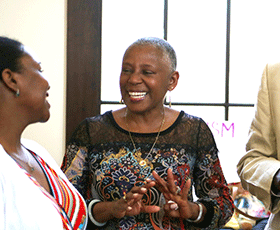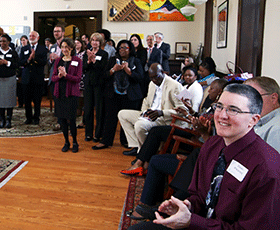Three Chosen for Advancement of Women Awards
Posted on March 25, 2015Three people were honored this week with the University Award for the Advancement of Women.
The awards, created in 2006, honor individuals who have mentored or supported women on campus, elevated the status of women or improved campus policies for them, promoted women’s recruitment and retention, or promoted professional development for women.
The three winners, one faculty member, one staff member and one student, receive a monetary award ($5,000 for faculty and staff winners, $2,500 for the student).
This year’s honorees are:
- Senior Maegan Clawges;
- Terri Phoenix, director of UNC’s Lesbian, Gay, Bisexual, Transgender, and Queer Center; and
- Carmen Samuel-Hodge ’94 (MPH, ’00 PhD), a research assistant professor in the department of nutrition at the Gillings School of Global Public Health and at the School of Medicine.
Maegan Clawges
Clawges is a senior journalism and computer science major who founded Pearl Hacks, an innovative technical competition hosted by UNC’s department of computer science and the School of Journalism and Mass Communication to help address the gender gap in computer science.
More than 500 women from 15 states attended this year’s hackathon. One nominator said Clawges, “on her own initiative and effort,” organized the event that was described as a “slumber party-cum-jamboree of computer programmers and app designers.”
According to the National Science Foundation, the percentage of female computer science majors has been decreasing since the mid-1980s despite increases in the percentage of women in medical schools, law schools and physical science fields.
Clawges said Pearl Hacks aims to help more women engage with computer science by building community and self-esteem among students and debunking some of the misconceptions about what it means to be a computer scientist.
“I chose to study computer science because I wanted to learn a skill that would be relevant no matter what type of work I ended up doing,” Clawges said. “And I stayed in the field because of the amazing community that I developed through hackathons, conferences and internships that I was fortunate to have.”
Terri Phoenix
Much of Phoenix’s career at Carolina has been dedicated “to ending interpersonal violence, especially violence that impacts women and marginalized individuals.”
In 10 years as director of the LGBTQ Center, Phoenix has approached the work from a social justice framework to free the campus of heterosexism, a system of attitudes, bias and discrimination in favor of opposite-sex sexuality and relationships.
“Our mission is to provide and foster a welcoming and inclusive environment for people of all orientations and identities and gender expressions,” Phoenix said.
The work requires changing not only the attitudes of individuals but the policies and practices of the institution itself.
This is something Phoenix understands — and experiences — firsthand. Identifying as transmasculine, Phoenix has close-cropped hair, wears suits and ties, and prefers gender nonspecific pronouns.
“When people say to me ‘Miss Phoenix’ rather than ‘Dr. Phoenix’ or ‘Mr. Phoenix,’ they are not seeing me,” Phoenix said. “So imagine you are walking through your day and everyone is referring to you by a pronoun that doesn’t fit you.”
Phoenix has been part of a campus task force that is reviewing “student-on-student” complaints of harassment, including sexual misconduct and discrimination.
“I want an institution that treats everyone equitably and where every individual who comes on this campus, whether they are here as a student or a member of the faculty or staff, has the same opportunity to take advantage of all the University has to give,” Phoenix said.
“That can only happen when people like me are able to walk through their day without having to encounter any extra barriers because of how they dress or who they love.”
Carmen Samuel-Hodge ’94 (MPH, ’00 PhD)
Samuel-Hodge was recognized for her work as a mentor to women of color who hold or are pursuing doctoral degrees. She has built an informal group, called “Sistah-docs,” that holds weekly check-in meetings where members are encouraged to share their concerns and celebrate their accomplishments to help keep everyone on track.

Carmen Samuel-Hodge is a research assistant professor in the Department of Nutrition at the Gillings School of Global Public Health and School of Medicine. (UNC photo)
Samuel-Hodge was recognized for her work as a mentor to women of color who hold or are pursuing doctoral degrees. She has built an informal group, called “Sistah-docs,” that holds weekly check-in meetings where members are encouraged to share their concerns and celebrate their accomplishments to help keep everyone on track.
Reflecting on Samuel-Hodge’s impact on her life, one Sistah-doc member wrote: “Without Carmen’s guidance and unyielding support, I would not have pushed through to complete my dissertation. She provided me with the consistent structure I needed to persevere. Carmen is the epitome of kindness and continues to ‘pay it forward’ through her research and mentorship.”
One nominator wrote: “The remarkable thing about Carmen was that she did this outside of her responsibilities as a faculty member, on her own time. Her devotion and continual guidance exceeded that of any mentor.”
Samuel-Hodge, who is from the U.S. Virgin Islands, has worked extensively with maternal and child health issues among minority and underserved populations.
She is the principal investigator of research projects funded by the Centers for Disease Control and Prevention and the National Institute of Diabetes and Digestive and Kidney Diseases.
With the CDC-funded project, she is conducting translational research with six health departments in North Carolina to evaluate the process of implementation and test the effectiveness of an evidence-based behavioral weight loss intervention implemented by public health practitioners.
Her grant from the National Institute of Diabetes and Digestive and Kidney Diseases focuses on developing and testing the effectiveness of a family-based weight loss and diabetes self-management intervention among adult African-Americans with type 2 diabetes and their family members.


